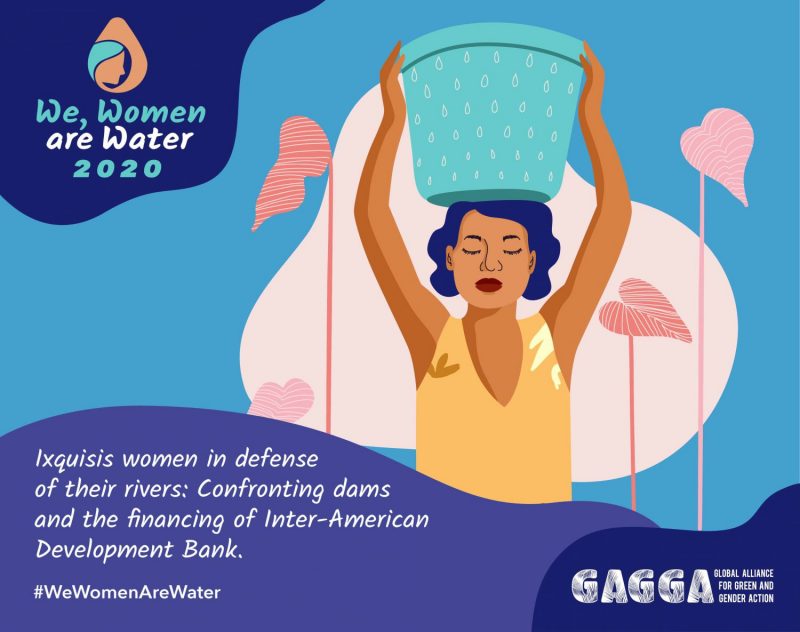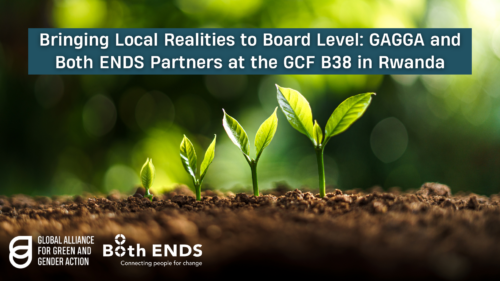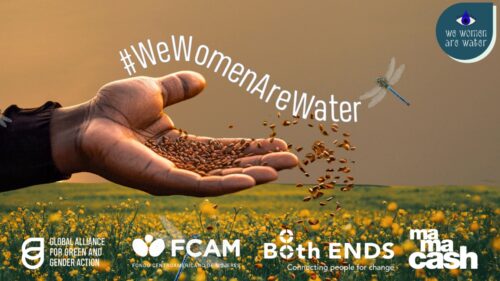We, Women are Water 2020: Ixquisis women defend their rivers

The micro-region of Ixquisis, in the north of the region of Huehuetenango, Guatemala, has been inhabited by indigenous Mayan communities since ancient times. These communities have built their ways of life based on respect and care for nature, subsisting mainly on agriculture and fishing. The rivers in the micro-region have long been a source of life for individuals and for the general population.
The women of Ixquisis are in charge of the sustainable management and care of the community’s natural assets. They play a key role in preserving traditional knowledge, powerfully transmitting their knowledge about health and nutrition to future generations. They have thus contributed to the survival of their culture, the indigenous worldview and their traditional way of life. For women, water is an essential element of their daily life.
In 2009, during a community consultation over possible development projects held in good faith, the communities of Ixquisis voted against the development of hydroelectric projects in their land with the intention of preserving the rivers and natural surroundings. In 2010, their decision was ignored. The company Promoción y Desarrollos Hídricos S.A. (now known as Energía y Renovación S.A.) began constructing two hydroelectric plants: Pojom II and San Andrés. The projects are co-financed by the IDB Invest, the investment arm in the private sector of the Inter-American Development Bank (IDB).
In the years since, the life of the Ixquisis communities has changed dramatically due to the construction of the dams. The works have caused scarcity and contamination of water sources, affecting families in the micro-region and especially women. Contamination and lack of water create an overload of work for women, since they are the ones who must ensure that the household has water and care for people who become ill from contact with water in the rivers where companies dump their waste.
The construction of dams has also brought insecurity and fear. In the region there have been attacks against members of the community, including murders and threats. Before the development of the Pojom II and San Andrés plants, women felt the land and their community to be a safe space – however on the contrary now women feel they are victims of attacks and/or aggressions in their communities.
In light of the damages to health that the lack of water has caused in the life of their communities, Mayan women have participated in the protests against the construction of hydroelectric plants.
The communities affected by the Pojom II and San Andrés dams filed an official complaint with the IDB’s Independent Consultation and Investigation Mechanism (MICI) with the objective of influencing the main actors involved. In the complaint, they ask the MICI to recognize that IDB Invest did not comply with its operational policies and, given this failure, to recommend that the Bank withdraw its investment from the dams considering the serious social and environmental damage these projects are causing. The complaint emphasizes that the impacts suffered by Ixquisis women are even more severe due to women’s daily contact with water and their traditional role as caretakers of natural resources.
The communities of Ixquisis demand of the Inter-American Development Bank that it:
- Strengthen its operational policies to ensure projects do not cause negative social and environmental impacts.
- Include a gender perspective in its operational policies, especially those related to social and environmental impact assessments.
- Conduct a review the portfolio of projects that it has financed and that it plans to finance in the future, from a human rights and climate action perspective with particular attention to the promotion of women’s rights.
- Strengthen its follow-up and monitoring of clients’ operations, in order to guarantee compliance with the operational policies and ensure their effectiveness.
Copyright © 2020 GAGGA. Image may not be copied, printed, edited or otherwise disseminated for commercial use without express written permission of GAGGA. The use of this image in its original form is otherwise allowed if credit is provided to GAGGA.

Welcoming Anamika Dutt As GAGGA’s Planning, Monitoring, Evaluation & Learning (PMEL) Officer!
Anamika Dutt is a feminist MEL practitioner from India. Anamika believes that stories of change and impact are best heard…

Bringing Local Realities to Board Level: GAGGA and Both ENDS Partners at the GCF B38 in Rwanda
Last week Both ENDS participated in the 38th Board Meeting of the Green Climate Fund in Kigali, Rwanda, together with…

We Women Are Water – Call To Action To Support And Finance Gender Just Climate Action
Gender just climate action and solutions are in urgent need of your support Women, girls, trans, intersex, and non-binary people…
Subscribe to our newsletter
Sign up and keep up to date with our network's collective fight for a gender and environmentally just world.
